Retinol is a vitamin A derivative dubbed as the one-stop-shop for all skin concerns.
It can be used to reduce the appearance of acne, reverse sun damage, fade hyperpigmentation, and even shrink pores.
But does retinol shrink pores for good? How does this happen?
I’ll answer these and a few more questions in a moment, but first, let’s discuss retinol itself.

How Does Retinol Work?
Retinol is a component that belongs to the family of retinoids, which are vitamin A derivatives.
It is one of the most studied ingredients in skincare, and for a good reason – it’s incredibly effective!
All retinoids work to increase collagen production, which helps keep the skin looking plump, smooth, and youthful.
They also help increase cell turnover, which unclogs the pores and removes dead skin cells faster.
Once the pores and clear and unclogged, there will be nothing to prevent the natural skin oil from flowing freely from the sebaceous glands and towards the skin surface.
This means that blemishes on the skin’s surface will also be reduced, thanks to retinol’s action.
Does Retinol Shrink Enlarged Pores?
Retinol is renowned for its ability to shrink enlarged pores; however, it’s important to note retinol doesn’t physically reduce pore size or close the pores – rather, it refines their appearance by promoting healthy skin cell turnover.
Pores are essential components of our skin, housing hair follicles and sweat and sebaceous (oil-producing) glands.
They play a vital role in regulating body temperature, such as sweating to cool down when overheated.
Additionally, pores allow oils produced by the sebaceous gland to reach the skin’s surface, providing moisturization and protection from bacteria and environmental threats.
Healthy pores are lined with keratin, a tough protein found in hair, nails, and skin.
However, disruptions to normal skin functions can lead to hyperkeratinization, a condition characterized by an overproduction of keratin.
This can be triggered by various factors, including hormonal changes, inadequate cleansing, using unsuitable skincare products, or other external factors, such as air pollution and UV exposure.
Hyperkeratinization disrupts the natural shedding process of skin cells.
Overproduction of keratin, combined with skin oil, causes dead skin cells to bond together.
Instead of naturally sloughing off, these cells remain within the pore, along with hardened sebum, leading to congestion.
To accommodate this buildup, the pore may enlarge.
This is where retinol comes into play.
Retinol accelerates cellular turnover and regulates the lifecycle of skin cells from the bottom layer of the epidermis.
This prevents the buildup of dead skin cells and hardened sebum, preventing clogs and refining the appearance of enlarged pores.
Therefore, while retinol cannot physically reduce pore size or close the pores, it can visibly refine their appearance by promoting healthier skin function.
What Causes Enlarged Pores?

Enlarged pores are caused by several internal and external factors:
1. Excess Oil Production
One of the most common causes of enlarged pores is excessive oil production.
When the sebaceous glands produce too much oil, the excess oil can fill the pores, causing them to expand in order to accommodate it, which makes them appear larger than normal.
This is particularly prevalent in people with oily or combination skin.
2. Accumulation of Dead Skin Cells
Similarly to excess oil, the buildup of dead skin cells can also contribute significantly to the enlargement of pores.
When skin cells die, they should naturally shed off to make way for new cell growth.
However, sometimes, this process doesn’t occur as smoothly as it should.
Therefore, the dead skin cells can accumulate on the surface, and when combined with excess oil, they can form a plug in the pore, causing it to expand.
Regular exfoliation can help remove these accumulated dead skin cells and unclog the pores, thus refining their appearance.
3. Aging and Loss of Elasticity
As we age, our skin tends to lose its elasticity due to the breakdown of collagen.
This loss of elasticity can cause the skin to sag and drag the pores downwards, making them appear larger.
Additionally, the natural aging process can cause the skin to thicken due to slowed-down cell shedding, pushing the pores to appear larger.
4. Sun Damage
Excessive sun exposure can lead to enlarged pores, as it thickens the skin and reduces its elasticity.
This can cause the pores to dilate.
Additionally, the sun’s harmful UV rays can cause the skin to produce more oil, which in turn can lead to enlarged pores.
5. Genetics
Lastly, genetics can play a role in the size of your pores.
If enlarged pores run in your family, you are more likely to have larger pores yourself.
While you cannot change your genetics, a good skincare routine can help minimize the appearance of enlarged pores.
When Should You Start Using Retinol for Large Pores?
Retinol can be incorporated into your skincare routine as early as your mid-20s.
However, the exact timing may vary based on individual skin needs and concerns.
If you have oily and acne-prone skin, you can start using retinol as early as your teens to combat large pores and puberty-related acne.
Conversely, visible signs of aging skin may appear as early as your mid-20s, which is a perfect time to gradually introduce retinol into your routine.
How Often Should You Use Retinol for Large Pores?
When starting a retinol serum or a cream, the best thing to do is introduce it into your routine slowly by using it 2-3 times a week.
Eventually, as your skin starts tolerating the product better, you should slowly increase usage until you can use it every day as a part of your evening routine.
The only time you should stop using retinol is during pregnancy due to the unclear effect it may potentially have on fetal development.
What Are The Main Benefits of Using Retinol?
Retinol offers many benefits for all skin types and the improvement of almost all skin concerns.
Some main benefits of using retinol include:
- Reduced acne.
- Faded hyperpigmentation and discoloration.
- Refined skin texture.
- Improved appearance of pitted acne scarring.
- Reduced skin redness, including post-inflammatory redness left from old acne.
- Improved appearance of fine lines and deeper wrinkles.
- Reversed signs of sun damage and discoloration caused by the UV rays.
- Strengthened skin barrier.
What Are Some Side Effects of Using Retinol?
As I already mentioned above, retinol does come with some side effects.
These are usually mild and don’t last long.
They also tend to occur when you first introduce retinol into your skincare routine and typically last a few weeks until your skin gets used to the active ingredient.
Some side effects associated with retinol use are:
- Mild to moderate irritation and redness.
- Peeling and shedding.
- Purging.
The Best Retinols for Enlarged Pores
Here are my top retinol choices for enlarged pores:
Alastin Skincare – Renewal Retinol .5 – $60
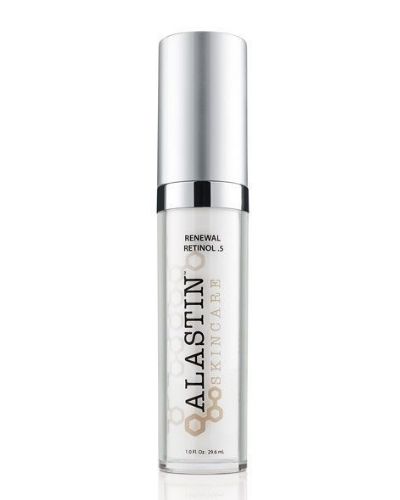
Alastin Renewal Retinol 0.5 is a beginner-friendly retinol for pores that helps improve the skin’s elasticity, tone, and texture.
It contains encapsulated retinol, which means the active ingredient will be released slowly into the skin and won’t cause irritation.
Besides, the product also contains ceramides and niacinamide to strengthen and repair the skin barrier, as well as antioxidants to neutralize free-radical damage, and oat extract, which is a powerful soothing ingredient that prevents irritation.
SkinCeuticals – Retinol 0.5 – $76
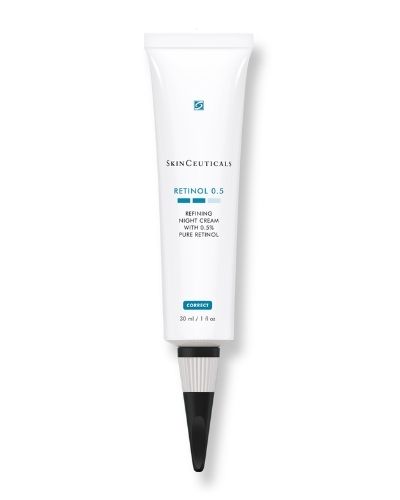
SkinCeuticals Retinol 0.5 is an ideal product for more hearty and resilient skin types dealing with acne breakouts, oiliness, enlarged pores, and maturing skin.
The purpose of this product is to promote peeling and cellular turnover to help skin cells travel to the surface of the skin faster and shed rapidly to achieve a healthier, clearer, and evened-out complexion.
Jan Marini – Age Intervention Duality MS – $95
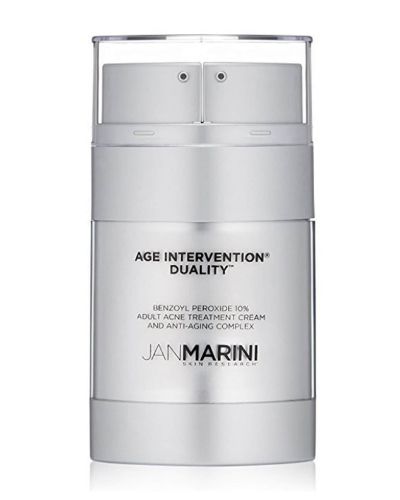
Jan Marini’s Age Intervention Duality is a retinol/benzoyl peroxide cream that addresses mild to moderate acne while simultaneously refining the appearance of enlarged pores and fine lines.
It has a dual-chamber dispensing bottle that combines 10% ultra-micronized benzoyl peroxide and highly concentrated all-trans-retinol.
But besides, the formula also contains soothing green tea extract, anti-aging peptides, hydrating and moisturizing ingredients such as hyaluronic acid and shea butter, as well as antioxidants to eliminate skin damage induced by free radicals.
Paula’s Choice – CLINICAL 1% Retinol Serum – $58
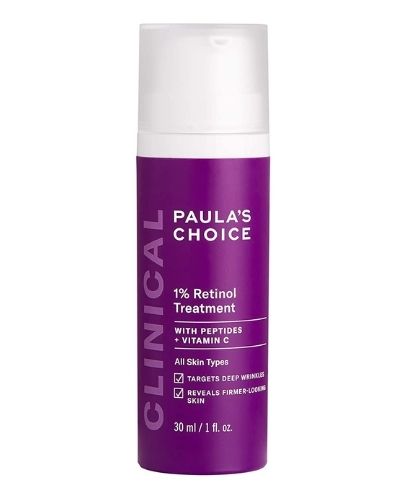
Paula’s Choice 1% Retinol Serum from the CLINICAL line is a lightweight, creamy serum that contains the highest percentage of retinol that you can get over the counter.
The retinol in this formula is encapsulated, which means it will refine pore size, diminish the appearance of wrinkles, fine lines, uneven skin tone, and hyperpigmentation.
However, it will be released into the skin over time to prevent irritation and excessive shedding.
Besides that, the formula contains nourishing licorice and oat extracts and other soothing plant extracts to calm and soothe the skin, as well as hyaluronic acid to keep it hydrated.
Vivant Skin Care – Derm-A-Gel – $64
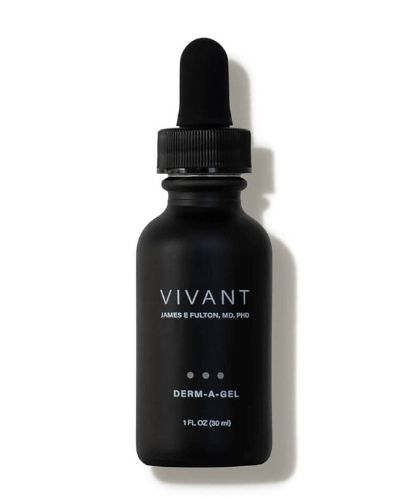
Derm-A-Gel by Vivant Skincare is a lightweight serum that gives your skin a revitalizing dose of a potent vitamin A that refines the appearance of enlarged pores, reduces fine lines and wrinkles, fades dark spots and hyperpigmentation caused by hormonal imbalances, and discoloration caused by UV damage.
The lightweight, gel-like formula is fantastic for all skin types as it also contains softening lactic acid as well as urea, glycine, moisturizing inositol, and barrier-strengthening niacinamide.
Over time, the Derm-A-Gel will strengthen the skin barrier, promote firmness and elasticity, and lead to a brighter, more unified complexion.
Retinol Alternatives for Enlarged Pores
Due to its side effects and the risk of potential effects on fetal development, many may decide to opt for a milder pore-refining option that they won’t have to stop using at some point in their lives.
And while nothing will compare to retinol’s action, there are safer components that are less likely to cause dryness, redness, and irritation while still doing a fantastic job in reducing the appearance of large pores.
Here are some retinol alternatives for enlarged pores:
Salicylic Acid
Salicylic acid, a type of beta-hydroxy acid (BHA), is renowned in skincare due to its ability to dissolve in oil and penetrate deep into the pores, unlike other water-soluble acids.
This makes it particularly effective at refining enlarged pores as it exfoliates the skin surface and also within the pores themselves, removing the buildup of dead skin cells and excess sebum that can cause pore enlargement.
When compared to retinol, salicylic acid is a milder option for those with sensitive skin, as it has anti-inflammatory properties and works well on acne-prone skin.
However, it may not be as effective at addressing fine lines and wrinkles as retinol.
Glycolic Acid
Glycolic acid, an alpha hydroxy acid (AHA), is another effective solution for refining enlarged pores.
It works by gently exfoliating the surface of your skin, breaking down the bonds between dead skin cells and revealing a brighter, clearer complexion.
This action can also help improve the appearance of uneven skin tone and hyperpigmentation as the uneven and damaged skin cells are encouraged to shed faster, making room for healthy and even cells from underneath.
In comparison to retinol, glycolic acid offers a more immediate exfoliating effect, which is beneficial for pore reduction and skin brightening.
However, it lacks retinol’s potent anti-aging benefits, such as its ability to stimulate deeper collagen production and reduce fine lines and wrinkles over time.
In terms of potential side effects, glycolic acid can cause mild irritation and sun sensitivity, similar to retinol.
However, these side effects are typically less severe and more temporary than those associated with retinol, which can include dryness, peeling, and increased sun sensitivity.
Niacinamide
Niacinamide, also known as Vitamin B3, is an essential nutrient that has gained popularity in skincare for its multifaceted benefits.
It’s particularly effective at refining enlarged pores as it regulates oil production and helps to balance sebum levels.
This reduces the likelihood of congestion within the pores, which can lead to their enlargement.
Additionally, niacinamide improves skin elasticity and promotes a smoother, more even-textured complexion.
When compared to retinol, niacinamide won’t provide the same level of anti-aging benefits, such as reducing deep-set wrinkles or improving skin firmness.
However, it has the advantage of being more tolerable by most skin types, including sensitive skin. It is less likely to cause irritation, sensitivity, or peeling that are often associated with retinol use.
In terms of potential side effects, niacinamide is generally well-accepted by all skin types, with minimal risks.
It does not increase photosensitivity and is less likely to cause redness, dryness, or flaking compared to retinol.
However, higher concentrations of niacinamide (above 5%) can sometimes cause skin irritation in some people.
Overall, niacinamide provides a more gentle approach to pore refining and skin brightening, while retinol delivers more powerful anti-aging results but with potential side effects.
Peptides
Peptides, which are short chains of amino acids, serve as the building blocks of key skin proteins like collagen, elastin, and keratin.
Their primary role in skincare is to assist in skin regeneration and repair, which can indirectly contribute to the reduction of enlarged pores.
By stimulating collagen production, peptides can improve skin elasticity and firmness, leading to a less pronounced appearance of pores.
Compared to retinol, peptides might not provide as dramatic results in reducing the signs of aging such as fine lines and wrinkles
However, they can be a great addition to your skincare routine, particularly for individuals with sensitive skin, as they are generally less irritating.
In terms of potential side effects, peptides are usually well-tolerated by most skin types and do not cause photosensitivity, unlike retinol.
However, they might not work as effectively on hyperpigmentation or uneven skin tone, which are areas where retinol truly excels.
Thus, while retinol is a powerhouse ingredient known for its potent anti-aging and pore-refining properties, peptides offer a gentler yet effective alternative for those looking to improve skin texture and firmness without risking potential irritation.

My name is Simone and I am a certified skin specialist. I created this website to teach my readers how to take great care of their skin and I also like to occasionally share my honest opinions on skincare products I’ve tried. You can learn more about me here.
